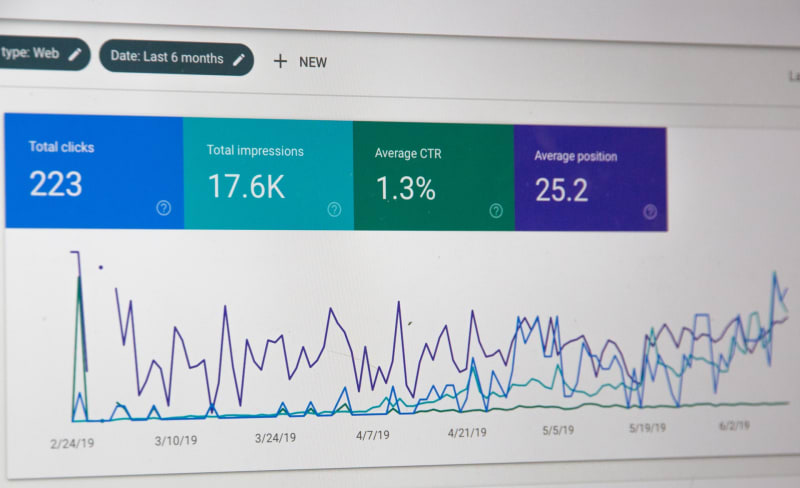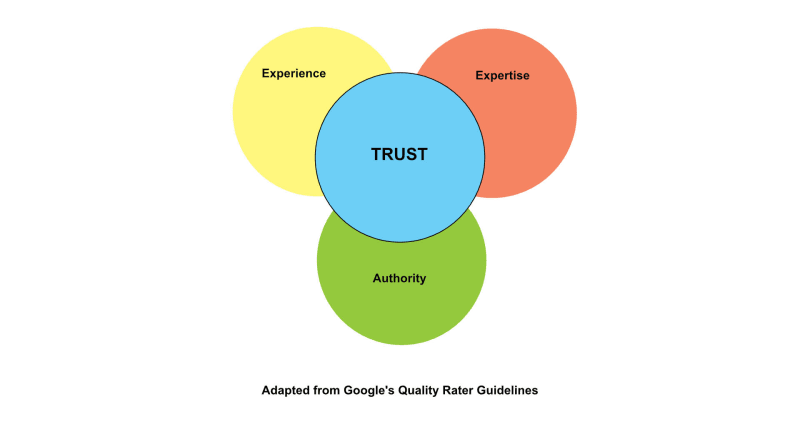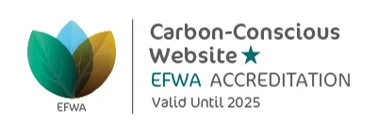Summary
Google wants to make sure that the pages that it places in the search results answer searchers queries in ways that show expertise, authority and trustworthiness. It certainly doesn’t want to serve up content that is weak, dubious or possibly fraudulent.
In this post, I’ll go into some more detail about these three quality factors - Experience, Expertise, Authority and Trustworthiness (known as E-E-A-T) and show how you can write content that meets these quality criteria in a more effective way.

What is E-E-A-T?
Keywords, speed, mobile friendliness, Core Web Vitals, security - all are important factors in where Google places a page for the search results. However, these are not enough to get a good ranking. You must also make sure that the content you publish is of high quality.
Google has created a set of Quality Rater Guidelines (QRG) which establish a set of criteria for determining whether a piece of content should be regarded as of good quality or not. The criteria centre around the content showing Experience, Expertise, Authority and Trustworthiness - hence E-E-A-T.
This 168 page document was written for Google’s rating team, who check out websites which do well in the Google results. Apparently, there are about 10,000 people employed by Google to do this work.
Google has established these guidelines because the people want to see good quality content and Google wants to put the sites that people want to read towards the top of the search results.
Update December 2022 - Google has now added a 4th factor - Experience - to the Quality Rater Guidelines - see Our latest update to the quality rater guidelines: E-A-T gets an extra E for Experience. So we now have E-E-A-T or ‘Double-E-A-T’. This does not alter the fundamental principles - Google is setting out a series of ways in which they can identify reliable content and so rank this higher in the search results. Google want to promote content that is trustworthy and the other 3 factors help gauge to what extent a piece of content can be classified as such.
Update April 2023 - There are more details about Experience as a factor below.
Why is it important?
E-E-A-T is more important for some sites than others. If you are an accountant, an IFA, mortgage broker or other financial professional, then E-E-A-T is especially important. Also, if your business is involved in healthcare of any sort, again, the E-E-A-T guidelines are especially important. Google refers to sites like this as YMYL (Your Money or Your Life).
The reason for this is that Google does not want to promote sites that offer information from poorly qualified (or unqualified) people when dealing with matters involving money or health as the advice offered could well be wrong and so be detrimental to the searcher.
If your business is not involved in finance or health, E-E-A-T is still important but less so.
So let’s look at each factor individually.
Update April 2023
Experience
This new factor is about showing you have first-hand experience of the topic being written about.
- if you’re writing about beekeeping, you need to demonstrate that you keep bees.
- if you’re writing about logo design, you must show that you have done this effectively.
- if you’re writing a product review, you must show you have actually used the product.
- if you’re writing about how to fill in a tax retrun correctly, you need to provide evidence that you have done this successfully.
This begs the question of how to show experience. The answer to this really depends on the type of content you’re producing. For a product review, you could include your own photos of the product with you using it. An article about beekeeping might also include your photos and could provide a parapgraph or two about your beekeeping background. Your About page is another good source of information regarding your experience. Your social profiles should also mention your experience.
Let’s be clear though, you don’t have to be an expert to have experience! However, to be an expert you will have experience.
For example, a Formula 1 driver is an expert driver - they have expertise in the topic of driving. I’ve been driving a car for more than 20 years so I have experience of driving but I’m not an expert.
Here’s another example, my accountant is an expert in financial accounting. She has relevant qualifications and runs a professional accountancy practice. I’ve been running a business for 15 years and have had to review the P&L, balance sheet and transaction reconciliations, so I have some expereince with accounts but I’m certainly no expert!
Expertise
Clearly, to write content that demonstrates expertise, you’ve got to know what you’re talking about (and have the necessary experience).

For most financial or health related topics, Google wants to see the qualifications and formal expertise of the author to establish expertise. Having an About page which is up-to-date with your qualifications, industry awards you have received, conferences you have spoken at etc, is a good way to establish expertise.
For content that is not related to money or health, the rules are less stringent but still relevant.
Being particularly knowledgeable about a certain subject is necessary, obviously, but, in Google’s terms, you also need to know how to communicate that knowledge is a way that is engaging and appropriate to what the searcher needs.
Authority
Having expertise and experience are great first steps but if, in addition, you are recognised by others in your area of expertise then you gain authority. This recognition comes through your articles/posts/pages being cited by others. This may be through:
- being linked to from authoritative websites which are relevant to your area of expertise
- simply being mentioned on relevant and authoritative websites
- your content being shared on social media on a regular basis.
When you publish something, it’s worth making an effort to publicise it, share it and promote it as this can help build your authority.
Google’s Quality Raters are told to look for independent information about businesses when checking authority see page 17
When searching for reputation information, try to find sources that were not written or created by the website, the company itself, or the individual. For example, IBM might have official Facebook or Twitter pages that it closely maintains, which would not be considered independent sources of reputation information about the company
If you are a small business, there may not be much independent information available about your company, but this is not regarded as a negative.
Frequently, you will find little or no information about the reputation of a website for a small organization. This is not indicative of positive or negative reputation. Many small, local businesses or community organizations have a small “web presence” and rely on word of mouth, not online reviews. For these smaller businesses and organizations, lack of reputation should not be considered an indication of low page quality.
A very effective way of gaining authority is to have a Wikipedia page for your brand or for specific people in your company. Getting a Wikipedia page can be quite difficult but it will a considerable boost to your company’s authority if you can manage it.
Bear in mind that authority is related to the subject matter. An established, well-known accountant is likely to have significant authority in the area of tax, but will have little or no authority in the field of veterinary medicine, for example.
Trustworthiness
Trustworthiness is about the verified accuracy of what is published on your website. It’s also about referencing trustworthy external websites in the content on your site. You should also link to other experts in your field as this shows that you have researched the topic.

It’s also important to be clear about who is responsible for the content on the website and provide a means of contacting them.
Trustworthiness can also be enhanced by:
- Providing a terms and conditions page as well as information about your privacy policy on your site.
- If you are selling products, there should be a page about refunds and returns.
In addition, if people are posting reviews about your services, your products or your content, keep an eye on these. If there are negative reviews, address these quickly, as too many negative reviews will damage your trustworthiness in the assessment by the Quality raters.
However, getting positive reviews and testimonials will build trust in your brand and it is worth seeking these out wherever possible.
Another useful activity, would be to check that older posts and articles are still up-to-date. If not, link to more current content or add a note to the post to say it is out-of-date. Having content on your site which is no longer accurate will be damaging to your trustworthiness of your site.
Is E-E-A-T a ranking factor in the Google search algorithm?
Not directly, as a machine can’t assess E-E-A-T. So Google does not assign a score to your web pages according to how well they match the E-E-A-T criteria. However, Google are constantly adjusting their algorithm in ways that aim to improve the quality of the search results using the data obtained through their army of quality raters.

A quick note on AI
Google is not opposed to content created by AI so there’s no need to avoid AI tools when drafting content, but you need to be aware of some of the shortcomings of all AI tools.
- They source their information from the internet and some content on the internet is downright wrong so your AI tool may create content that is partially (or completely wrong) as well.
- The information available to AI tools is out-of-date, maybe by a year (or more).
- Sometimes, if AI tools can’t find relevant info, they may make something up!
So, AI is good for creating content outlines and/or an initial draft for some content but it needs to be checked, otherwise it may seriously damage your E-E-A-T!
Conclusion
E-E-A-T is an approach Google uses to protect searchers from dubious, poor quality content and limit the spread of misinformation, which is surely something to be applauded. So, if your site’s content does not demonstrate that the content is trustworthy, it is unlikely that your site will rank well in search.

Google has established these guidelines because this is what people want and Google want to put the sites that people want to read towards the top of the search results. So, adjust your content for E-E-A-T and show that it is trustworthy, not so much for Google’s sake but for your site visitors’ sake. Don’t follow the guidelines slavishly but consider how best to signal to Google that your content can be trusted and this will depend on the type of content you produce. In that way you stand the best chance of ranking better in Google search.
If you’d like some advice and guidance in the area of content writing, please get in touch.
References/Further Reading
- How to Use Digital PR to Improve E-E-A-T Signals
- The new E in E-E-A-T, or the importance of Experience
- 5 Things I Learned About E-A-T by Analyzing 647 Search Results
- E-A-T and SEO: How to Create Content That Google Wants
- What is E‑A-T? Why It’s Important for SEO
- In Quality Raters’ Handbook, Google Adds Higher Standards For “Your Money Or Your Life” Websites
- How to produce high quality written content
- Show Don’t Tell
- How to write a blog post: A step-by-step guide from preparation to publication
- What Is Content Writing? 13 Tips for Creating Amazing Content
- This article includes a lot of stats. Look at number 31 about the effect of bad content. 81 of the Most Up-to-Date Blogging Statistics in 2021
- SEO Writing: 7 Steps to Create Search-Optimized Content
- 21 Writing Tips to Become a Better Writer Fast
